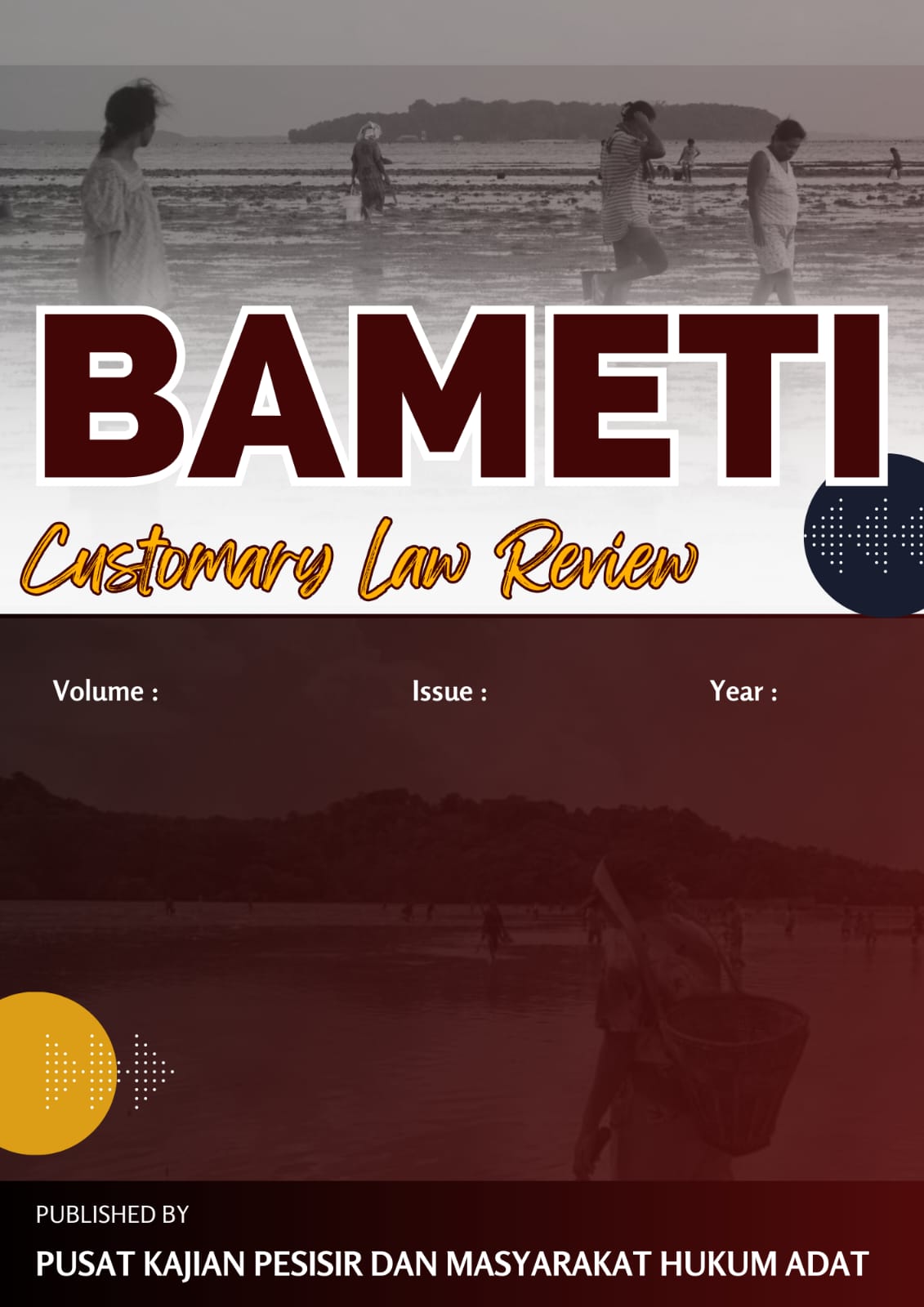Hak Waris Atas Tanah Adat Berdasarkan Hukum Waris Adat
Abstract
Inheritance law is the law that regulates the transfer and continuation of tangible and intangible property from one generation to the next. The initiation of this procedure occurs throughout the lifetime of the parents. The subjects involved in inheritance distribution are the deceased (testator) and the heirs. The deceased and the heirs have a close relationship due to familial ties. This research aims to examine the inheritance rights over customary land based on customary inheritance law and to understand and explain it. The research uses normative juridical legal research, with primary and secondary legal materials as legal sources. The results of the study show that customary inheritance law is a law that is recognized and respected in its implementation, but the registration of inheritance transfers of land based on customary inheritance law cannot be fully carried out. The position of heirs in the inheritance distribution in Hila Village is passed down only to male children, while female children only have the right to enjoy the land, such as through farming, but are not considered heirs as long as there are male children.
Downloads
References
Adonia Laturette, Penyelesaian Sengketa Hak Atas Tanah Masyarakat Hukum Adat, Sasi 22 no 2 (2016).
A. Soehardi, Pengantar Hukum Adat Indonesia, Bandung: Mandar Maju, 2006.
Badriyah Harun, Panduan Praktis Pembegian Warisan, Yogyakarta: Pustaka Yustitia, 2010.
Bushar Muhammad, Hukum Adat Suatu Pengantar, Jakarta: Pradnya Paramita, 1994.
Cahyani, Tinuk Dwi, Hukum waris dalam Islam: Dilengkapi Contoh Kasus dan Penyelesaiannya, no 1. UMMPress, 2018.
Dewi Wulan Sari, Hukum Adi Indonesia, Bandung: Refika Aditama, 2012.
Djamanat Samosir, Hukum Adat Indonesia Eksistensi dalam Dinamika Perkembangan Hukum Adat Di Indonesia, Bandung: Nuansa Aulia, 2013.
Ellyne Dwi Poespari, Pemahaman Seputar Hukum Waris Adat Di Indonesia, Jakarta: Prenamedia Group, 2018.
Eman Suparman, Inti Sari Hukum Waris Indonesia, Bandung: Mandar Maju, 1991.
Hazairin, Hukum Kewarisan Bilateral Menurut Al-Qur’an dan Hadis, Jakarta: Tintamas, 1983.
Harsono B, Hukum Agraria Indonesia, Sejarah Pembentukan Undang-Undang Pokok Agraria, Isi dan Pelaksanaannya. Jakarta: Djambatan; 2007.
Hilman Hadikusuma, Pengantar Ilmu Hukum Adat Indonesia, Bandung: Mandar Maju, 1992.
Hallauw D K, Matuankotta J K, Uktolseja N. Analisis Hukum Surat Pelepasan Hak Atas Tanah Adat (Dati) Di Kota Ambon. SASI, 26 no 1 (2020): 111–8. https://doi.org/10.47268/sasi.v26i1.256.
Lakburlawal, Mahrita Aprilya. “Akses Keadilan Bagi Masyarakat Adat Dalam Penyelesaian Sengketa Tanah Ulayat Yang Diberikan Hak Guna Usaha.” ADHAPER: Jurnal Hukum Acara Perdata 2 no 1 (2016): 59-75.
Lewerissa, Jessica Manuela, Barzah Latupono, and Agustina Balik. “Kedudukan Dan Hak Ahli Waris Terhadap Harta Warisan Menurut Kitab Undang–Undang Hukum Perdata.” TATOHI: Jurnal Ilmu Hukum 2 no 12 (2023): 1193-1208.
Mariot P. Siahaan, Bea Perolehan Hak atas Tanah dan Bangunan (Teori dan Praktek), Jakarta: Raja Grafindo Persada, 2005.
Matuankotta J K. Pengaturan Pemanfaatan Tanah Berbasis Kearifan Lokal. Universitas Hasanuddin, 2016.
Mohd. Idris Ramulyo, Beberapa Masalah Pelaksanaan Hukum Kewarisan Perdata Barat (Burgerlijk Wetbook) Jakarta: Grafika, 1993.
Santoso U. Pendaftaran dan Peralihan Hak atas Tanah. (Jakarta: Kencana; 2010).
Tolib Setiady, Inti Sari Hukum Indonesia dalam Kajian Kepustakaan, Bandung Alfabeta.
Uktolseja, N., Matuankotta, J. K., Radjawane, P., & Matayane, Penyuluhan Hukum Problematika Tanah dan Penyelesaiannya di Negeri Wotay Maluku Tengah. AIWADTHU: Jurnal Pengabdian Hukum, 1(1), 2021.
Copyright (c) 2025 Marzan Sopaliu, Adonia Ivonne Laturette, Mahrita Aprilya Lakburlawal (Author)

This work is licensed under a Creative Commons Attribution-NonCommercial 4.0 International License.
Authors who publish their manuscripts in this Journal agree to the following conditions:
- The copyright in each article belongs to the author, as well as the right to patent.
- Authors are able to enter into separate, additional contractual arrangements for the non-exclusive distribution of the journal's published version of the work (e.g., post it to an institutional repository or publish it in a book), with an acknowledgment of its initial publication in this journal.
- Authors are permitted and encouraged to post their work online (e.g., in institutional repositories or on their website) prior to and during the submission process, as it can lead to productive exchanges, as well as earlier and greater citation of published work.
- Authors have the right to self-archiving of the article (Author Self-Archiving Policy)













